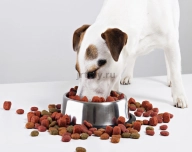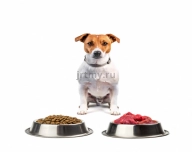What's the danger of Christmas for dogs?
What's the danger of Christmas for dogs?
On public holidays, you should be especially attentive to your pets. These are the main dangers that await our four-legged friends during the Christmas season.

During the Christmas holidays, domestic dogs are four times more likely to be ill because of the consumption of food harmful to them, especially chocolate, warned veterinarians. Dogs like the taste of chocolate, but even a small piece of chocolate can seriously affect their health.
A study published in Veterinary Record found hundreds of cases where four-legged people needed treatment after stealing chocolates from a table or tree.
Veterinarians remind owners that confectionery must be kept out of the reach of pets. If your dog does find sweets, you need to go to the vet immediately and try to determine what has been eaten and in what quantity.
Chemical theobromine found in cocoa beans breaks down too slowly in the dog's body. This can lead to illness, increased heart rate, anxiety, seizures, and sometimes death.
A study by British scientists has shown that chocolate intoxication is four times more likely on Christmas than on a normal day. The most common symptom was vomiting, accompanied by an increased heartbeat.
Treatment depends on how much time has passed since the dog ate the harmful product. Usually, the dog is given medication to induce vomiting and activated carbon to stop further absorption of the toxic substance. Your dog may then need fluid therapy and medication to fight the effects of toxins on his heart.
Other common dangers for dogs on holidays are firecrackers and fireworks. Loud noises can be very stressful for pets. When your dog hears a sudden rumble, he can run away and get lost. It is advisable to avoid noisy places when walking with your dog and to keep your dog on the leash, especially in the evening.



